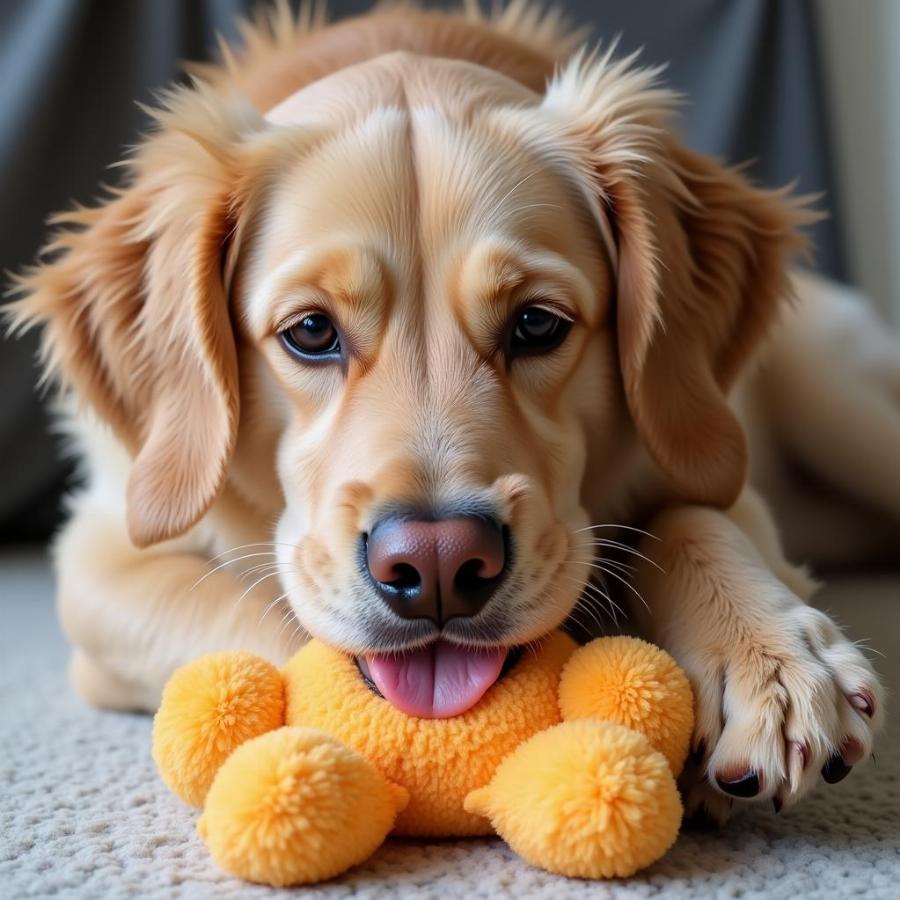Your furry friend recently underwent neutering, and now they’re nibbling more and playing rougher than usual. Is this normal? Many dog owners experience similar changes in their pet’s behavior after neutering, and understanding why can help you navigate this period. This article dives into the reasons behind this behavior shift and provides guidance on managing it effectively.
Why Is My Neutered Dog Nibbling and Playing Rough?
Several factors can contribute to increased nibbling and rough play after neutering. Hormonal fluctuations play a significant role. Although neutering reduces testosterone levels, the remaining hormones can still influence behavior. Some dogs experience a temporary increase in certain hormones after the procedure, leading to heightened energy and playful aggression. This might manifest as increased nibbling and roughhousing. Pain or discomfort at the incision site can also contribute to these behavioral changes. Your dog might be nibbling as a way to soothe the area or acting out due to frustration.
 Neutered Dog Nibbling on Toy
Neutered Dog Nibbling on Toy
Moreover, the change in routine associated with the recovery period can also affect your dog’s behavior. Limited physical activity and confinement can lead to pent-up energy, which they might express through nibbling and rough play. Finally, some dogs simply experience a shift in temperament after neutering, regardless of hormones or discomfort.
Managing Nibbling and Rough Play in Neutered Dogs
Understanding the reasons behind the behavior is the first step to managing it effectively. If your dog is nibbling excessively, provide appropriate chew toys to redirect the behavior. This not only satisfies their need to chew but also prevents them from nibbling on furniture or other inappropriate items. Ensure your dog is receiving adequate pain relief if discomfort from the incision is suspected. Consult your veterinarian if you notice any signs of infection or excessive licking.
Encourage calm behavior by providing a quiet and comfortable recovery space. Once your veterinarian gives the all-clear, gradually reintroduce physical activity to help your dog release pent-up energy in a healthy way. Engage in gentle play sessions and short walks, gradually increasing the intensity as your dog recovers. Training can also be beneficial in managing rough play. Teach your dog commands like “gentle” and “leave it” to help them understand appropriate play boundaries.
Is My Neutered Dog in Pain?
Sudden changes in behavior, including nibbling and rough play, can sometimes indicate underlying pain. If your dog exhibits other signs like whining, excessive licking of the incision site, loss of appetite, or lethargy, consult your veterinarian immediately.
“It’s important to remember that each dog reacts differently to neutering,” says Dr. Emily Carter, a veterinary surgeon with over 15 years of experience. “While some dogs might become calmer, others might exhibit temporary changes in behavior, including increased nibbling and rough play. Careful observation and appropriate management strategies are key to ensuring a smooth recovery.”
Conclusion
While nibbling and playing rough after neutering can be concerning, it’s often a temporary phase. By understanding the potential causes and implementing appropriate management techniques, you can help your furry friend adjust to their new normal and enjoy a happy and healthy life. Remember to consult your veterinarian if you have any concerns about your dog’s behavior or recovery.
FAQs
- Is it normal for my dog to be more energetic after neutering? Yes, some dogs experience a temporary increase in energy levels after neutering due to hormonal fluctuations.
- How can I stop my dog from nibbling on furniture? Provide appropriate chew toys and redirect their attention when they start nibbling on furniture.
- When can I resume normal activity with my neutered dog? Follow your veterinarian’s instructions regarding exercise and activity after surgery.
- Should I be concerned if my dog is licking the incision site excessively? Excessive licking can indicate pain or infection. Consult your veterinarian if you notice this behavior.
- How long do behavioral changes after neutering typically last? Most behavioral changes are temporary and subside within a few weeks.